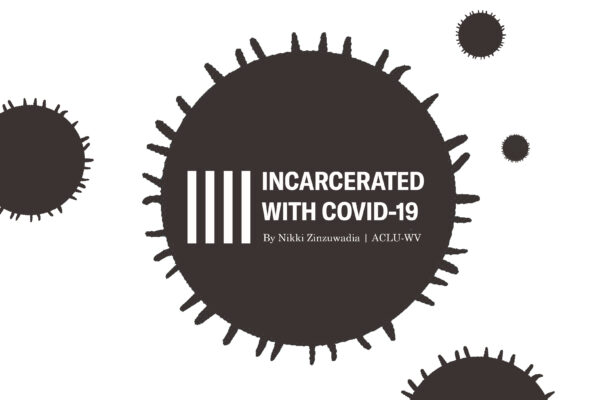West Virginia House Bill 2419, a bill reducing the number of pretrial detainees in West Virginia jails, took effect June 5. Gov. Jim Justice signed it into law March 25, after it was passed by state lawmakers during the 2020 legislative session.
The law requires judges and magistrates to release people charged with certain misdemeanor offenses without posting bail. In nearly all other cases, judicial officials must use the “least restrictive” bail conditions to ensure public safety and appearance at trial.
It's a positive step toward advancing pretrial reform and lowering the unconvicted population in West Virginia’s corrections system. Given COVID-19’s impending threat, and how rapidly it can spread within correctional facilities, reducing our incarcerated population is more vital than ever. The pretrial detention system can leave innocent and vulnerable people at risk for COVID-19, turning their time awaiting trial into a potential death sentence.
In January, the West Virginia Department of Military Affairs and Public Safety reported that more than half of the people incarcerated in the state’s 10 regional jails were awaiting trial. As of March 4, shortly before West Virginia declared a COVID-19 state of emergency, eight of these facilities were overcapacity, with 5,168 people incarcerated in the state but only 4,265 beds available.
According to the West Virginia Center on Budget & Policy, COVID-19 reforms by state courts, prosecutors, and law enforcement initially lowered the average daily jail population by 21 percent. Nearly three-quarters of this decline was driven by a reduction in pretrial detainees throughout March and April.
However, West Virginia’s incarcerated population is now increasing at an alarming rate, mostly due to newly incarcerated individuals being held pretrial. Numbers provided by the state’s Division of Corrections and Rehabilitation indicate a 16 percent increase in the total jail population between April 28 and June 15. Moreover, the pretrial population grew by nearly 21 percent, with a staggering 53 percent increase in people held awaiting trial for misdemeanors.
With this new law in effect, West Virginia's pretrial population should drop dramatically. Especially during the COVID-19 pandemic, expanding pretrial release is increasingly urgent.
In the United States, there was a 433 percent increase in the use of pretrial detention between 1970 and 2015. Many pretrial inmates are charged with low-level offenses, with three out of four criminal cases in state trial courts encompassing misdemeanors.
Even in non-pandemic times, our system of pretrial detention is brutal and unfair. Pretrial detainees have worse outcomes than those who are able to secure pretrial release. The Bail Project notes that people incarcerated pretrial can lose their jobs, homes, and sever ties with their families and communities. They are more likely to experience mental and physical trauma, and many feel immense pressure to plead guilty to an unjust or wrongful conviction just to be released.
The pretrial detention system also disproportionately impacts communities of color. As of 2002, the last time the United States collected this data nationally, about 7 in 10 people incarcerated pretrial were people of color. Research studies have found that people of color, who are charged with the same offenses and have similar criminal histories as whites, are more likely to be detained pretrial and have higher bail amounts.
Additionally, the cash bail system unfairly rewards the rich and punishes the poor. It perpetuates an endless cycle of mass incarceration and economic inequality, where the presumption of innocence only applies to those who are well off. The vast majority of people who are sitting in jail awaiting trial are there because they simply are too poor to make bail. While unconvicted people who cannot afford bail remain in jail, those who have access to financial resources can buy their freedom.
In response to COVID-19, a number of states have taken steps to minimize rates of pretrial incarceration. Between March 1 and May 1, 3,399 prisoners were released from Maryland’s correctional facilities, including 1,207 individuals from pretrial detention. In April, the Massachusetts Supreme Judicial Court ordered early releases of thousands of pretrial inmates. The federal court in Arizona created an expedited procedure, effective April 7, to rule on pretrial and presentence defendants seeking release from custody.
The current pandemic is exposing the necessity of pretrial reform that has been long overdue in the United States. In the wake of this public health crisis and beyond, we must confront these existing challenges and work towards more fairness in America’s criminal justice system. While positive measures have been taken to address rising pretrial incarceration in West Virginia and across the nation, much more comprehensive, permanent work needs to be done.
According to the Prison Policy Initiative, more than 555,000 people currently incarcerated in the United States have not been convicted of any crime. Lower-level offenses account for over 25 percent of the daily jail population across the country.
Releasing individuals from jails and prisons who pose no immediate threat to public safety is critical to combating the devastating effects of the current pandemic. As of June 9, The Marshall Project reported that at least 43,967 prisoners had tested positive for COVID-19. 522 inmates have died from coronavirus-related causes.
The ACLU, partnering with multiple U.S. universities, predicted 200,000 deaths from COVID-19 in the United States if we do not lower the number of people we incarcerate.
Now, as the Trump Administration projects COVID-19 deaths in the nation to surpass 200,000 by October, the need to honor the presumption of innocence for those merely charged with a crime and end the mass incarceration of people awaiting trial is more important than ever.

